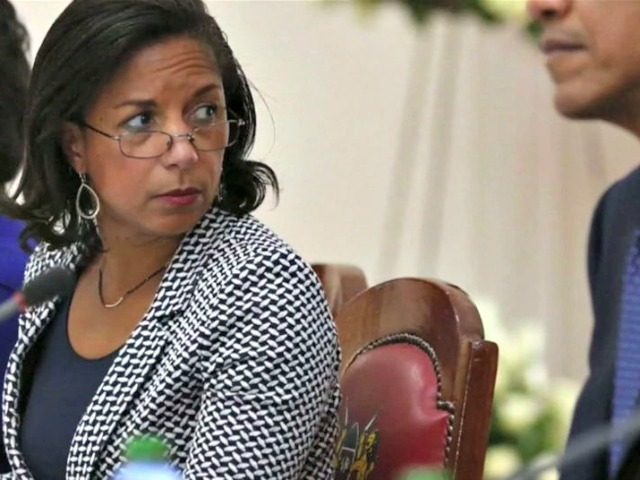Sen. Lindsey Graham (R-S.C.) said he would continue to look into whether Obama National Security Adviser Susan Rice improperly unmasked Trump campaign officials, after she declined his invite to testify before the Senate Judiciary Committee on Russian interference in the 2016 elections next week.
“At an appropriate time, I expect we will continue down this path. I hope Ms. Rice will come before the committee – and not just the press,” he said in a statement late Wednesday.
President Trump slammed her decision in a tweet Wednesday: “Not good!”
Rice’s lawyer Kathryn Ruemmler notified Graham and Sen. Sheldon Whitehouse, ranking member of the Senate Judiciary Subcommittee on Crime and Terrorism, on Wednesday in a letter of Rice’s decision not to appear before the committee.
The letter said “it is extremely rare” for Congress to request the testimony of a former senior adviser to the President, and that the invitation was less than two weeks before the hearing was scheduled to occur, and without consultation with Rice.
The letter said Rice was prepared to assist Congress’s efforts to look into Russian interference, but only if it was in a “bipartisan manner, and as appropriate, in classified session.”
“Senator Whitehouse has informed us by letter that he did not agree to Chairman Graham’s invitation to Ambassador Rice, a significant departure from the bipartisan invitations extended to other witnesses,” the letter said.
“Under these circumstances, Ambassador Rice respectfully declines Senator Graham’s invitation to testify,” it said.
Former Acting Attorney General Sally Yates and former Director of National Intelligence James Clapper will still testify before the committee on Monday, Graham said in his statement.
It will be the first time Yates is testifying before the committee.
Whitehouse told CNN that he agreed on those witnesses “with the exception” of Rice.
“I don’t believe that Dr. Rice’s participation is germane to the topic of this hearing, and I believe her presence would be a distraction from the critical issues at hand. I fully support her decision not to testify,” Whitehouse told CNN.
Rice has come under scrutiny after media reports revealed she had requested the unmasking of the identities of Trump campaign officials who were incidentally caught up in surveillance of foreign targets.
Americans’ identities are shielded during that surveillance for moral and legal reasons, but senior officials can request the unmasking if there is a need to know for national security reasons.
In media interviews, Rice has not denied unmasking Trump campaign official names, just doing anything illegal or “untoward.” On Sunday, she said unmasking was “not uncommon.”
However, a recent Wall Street Journal editorial took issue with her assertion, pointing out that Democrats in 2005 had claimed the practice was infrequent, especially by political appointees. It also said that Rice had no direct intelligence duties in her role as national security adviser.
“Ms. Rice had no direct intelligence duties in her NSC post, and no Democrat has provided a valid reason that Ms. Rice might have needed to unmask anyone associated with the Trump presidential campaign,” the editorial said.
A source “familiar with Rice’s discussions” told CNN that she was “prepared to accept” the invitation because she believed it was a bipartisan overture, until Whitehouse indicated to her that the invitation was made without his agreement, since he believed her presence was not relevant to the topic of the hearing.
The source said Rice considered the invitation a “diversionary play” to distract attention from the FBI’s investigation into Russia’s election interference and any coordination between Moscow and the Trump campaign.
Graham said he was disappointed with Rice’s decision.
“I don’t know why she won’t come before the committee to tell us what she did or didn’t do. But we’ll deal with her later,” he said, according to CNN.
He said he wanted to have a hearing on “unmasking” the identities of Americans caught up in surveillance of foreign targets before reauthorizing Section 702 of the Foreign Intelligence Surveillance Act.
“I want to know about unmasking,” he said. “Apparently the number of unmasking requests tripled last year, versus 2015…I want to know who can unmask an American citizen’s name who is caught up in surveillance, and what they can do with that information.”
House Intelligence Committee Chairman Devin Nunes (R-CA) on March 15 requested information from the CIA, NSA, and FBI on how many times Americans had been unmasked in the last six months.
Although he stepped aside from his committee’s probe into Russian interference, he is continuing to probe the separate issue of unmasking.
In February, Trump National Security Adviser Michael Flynn resigned from his position, after officials leaked to the media the contents of a phone conversation he had with Russian Ambassador Sergei Kislyak that differed from what he had told Vice President Mike Pence.
Yates, who was then-acting Attorney General, had notified the Trump White House about the conversations, but it is not publicly known who leaked those conversations to the Washington Post in February.
Rice’s lawyer said the former national security adviser was “prepared to assist Congressional inquiries into Russian election interference,” provided they are conducted “in a bipartisan manner, and as appropriate, in classified session.”
Rice is expected to be invited to testify in front of the House Intelligence Committee, according to the Wall Street Journal.

COMMENTS
Please let us know if you're having issues with commenting.